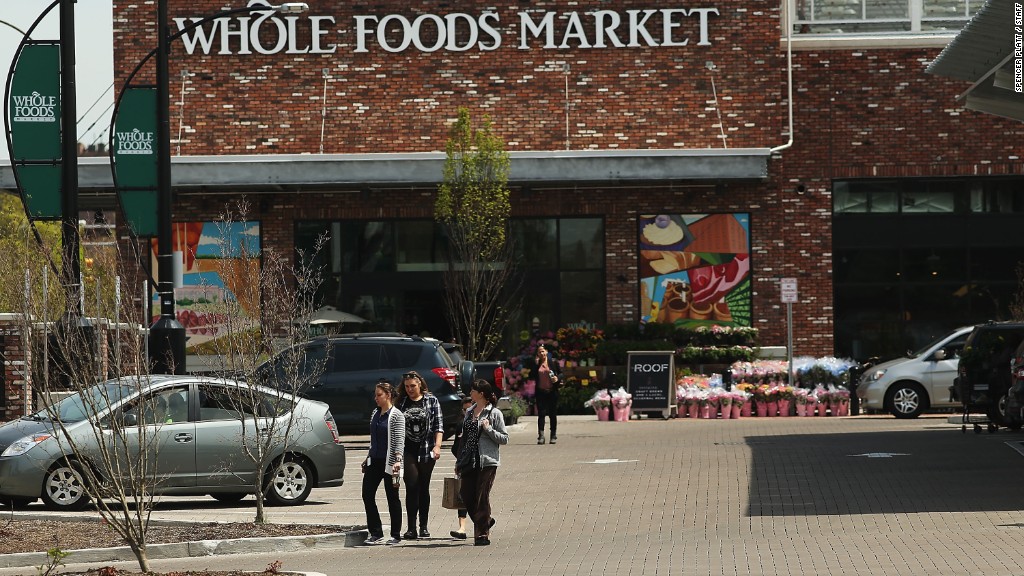
Whole Foods is not known for its bargain prices. But its stock is currently having a nearly half-off sale. That's not a good thing.
The organic grocer is one of the worst performers in the market this year. Shares of Whole Foods (WFM) have plunged nearly 40%.
The company is at a crossroads. Whole Foods has disappointed investors with sluggish sales growth.
Competition from the likes of Kroger (KR), Walmart (WMT) and Costco (COST) has been brutal. They have all expanded their organic and natural offerings -- products that are typically much cheaper than what you get at Whole Foods.
The King of Kale (Sultan of Spelt? Titan of Tempeh?) also announced in late September that it was laying off 1,500 employees.
Making matters worse, Whole Foods has had to clean up after a price-fixing scandal.
Related: Whole Foods cutting jobs
New York City's Department of Consumer Affairs said in June that Whole Foods was "systematically overcharging" for some pre-weighed items in its Big Apple stores.
Whole Foods subsequently apologized for the pricing errors, but maintained that they were "inadvertent" and were even occasionally in favor of consumers.
But the bad publicity has hurt. Whole Foods said in July that same-store sales, which measures how well stores open at least a year are doing, fell during the week that New York City accused Whole Foods of price gouging.
"The impact was really felt across the whole country, not [just] in New York City. This was national news," said Whole Foods CFO Glenda Flanagan in a conference call with analysts.
So Whole Foods has a lot to prove when it reports its latest earnings after the closing bell on Wednesday.
The expectations are fairly low. Analysts are forecasting a slight decline in profits from last year and same-store sales growth of just 0.7%.
Can Whole Foods turn things around? It may be tough.
Ajay Jain, an analyst who follows Whole Foods for Pivotal Research Group, said it wouldn't be a big surprise if same-store sales actually fell this quarter.
Related: This grocer is eating Whole Foods' overpriced organic lunch
Whole Foods has responded to the competition by lowering prices. But that has dented its profit margins, which Wall Street does not like.
And even with the price cuts, the company is still known by the unflattering nickname of Whole Paycheck to many consumers. The price-fixing allegations didn't help its reputation either.
To be fair, Whole Foods is not the only organic food chain that is struggling. Shares of smaller rivals Sprouts (SFM), Fresh Market (TFM) and Fairway (FWM) have all plunged this year too.
Whole Foods is also trying to resurrect its growth with a new chain of stores, 365 by Whole Foods Market, in some big cities next year.
These stores are expected to be smaller than most Whole Foods and have cheaper prices. It's a strategy that many feel is an attempt by Whole Foods to curry (organic muchi powder no doubt) favor with Millennials.
Whole Foods is missing a huge market rally. Investors are greedy again
But some analysts are worried that the new stores will eat into, or cannibalize, sales at existing stores. After all, it's not as if there aren't Whole Foods stores already in major urban markets.
If Whole Foods doesn't get on track soon, then there could be more calls for the company to take even more drastic measures to boost profits ... or even put itself on the block.
There were vague rumors last year about privately held supermarket chain Publix being interested in buying the company. More recently, there has been chatter about Whole Foods possibly going private.
Some have even speculated that an activist hedge fund might want to take a stake in Whole Foods to shake things up.
Jain said that as long as Whole Foods continues to slump, anything's possible.


